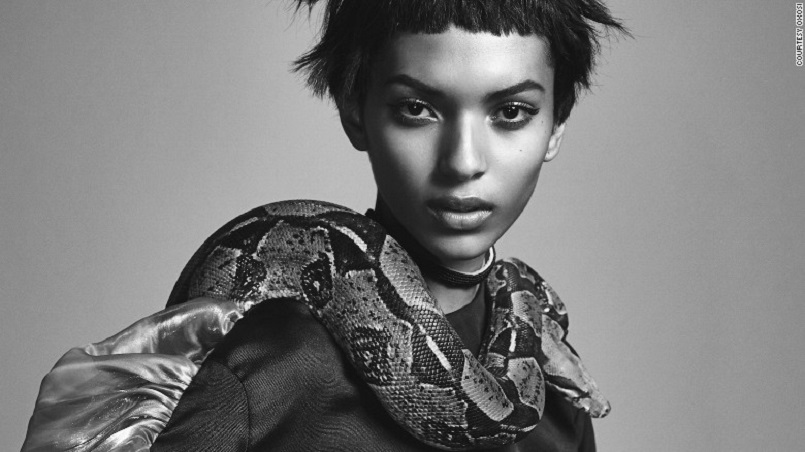
An increasing number of designers on the continent are morphing from small tailor businesses into recognized and respected fashion houses, thanks to the internet.
In 2014, when Beyoncé was spotted wearing a skirt and jacket from South African brand Kisua, it sold out in days. The musician's stylist had come across the brand online.
"The internet is a great leveler," says Kisua's Ghanaian founder Samuel Mensah. "The speed with which you can access markets and can generate awareness about your brand is unprecedented in the history of fashion."
The e-commerce platform, launched in 2013, sells its own clothes and collaborates with other designers to create collections for its label. It was born out of Mensah's travels around the continent as an economist.
When overseas, friends would create wish lists for him. "Next time you are in Senegal or Nigeria or Kenya please buy me this, that I saw so-so wearing," he explains.
"It always intrigued me why the [African] fashion was so inaccessible. I couldn't understand why nobody was doing this because consumers obviously wanted the products."
E-commerce seemed the logical solution.
A billion dollar market
If estimates by Mckinsey's Global Institute prove fruitful, Africans could be buying $75 billion worth of goods and services online by 2025, taking into account the region's recent economic slowdown. In Nigeria, the continent's largest consumer market, revenue has doubled each year since 2010.
The country has the largest online apparel market in Africa, expected to grow from an estimated $104m in 2014 to nearly $1.1bn in 2019 according to research by Euromonitor International.
The sheer size of Nigeria's population of 180m mean its consumers spent $400 billion in 2014, McKinsey estimates.
Currently 75% of people in Africa are still offline. But internet access increasingly via mobile phone subscription is growing and predicted to reach 41 percent of Africa's population by 2020.
A further survey by Ipsos Mori and PayPal reveals 89 percent of Nigeria's internet users shop online or expect to do so in the future.
Overseas interest
Last year saw the launch of New York based ONYCHEK, an e-commerce site selling luxury apparel from Africa to customers in the US, Canada and UK.
"We are trying to make fashion made in Africa available to everybody," says founder Chekwas Okafor.
Okafor's father historically exported textiles from China into Nigeria, and by naming the brand after his dad's company he aims to do "the reverse".
"African Americans are excited about supporting African brands and then there are those consumers who are just excited about ethical and sustainable fashion. Those are our customer base," he adds.
It's a logic shared by the creators of fellow New York based OXOSI, also launched in 2016. Nigerian founders Akin Adebowale and Kolade Adeyemo aim to connect emerging brands from the continent with global consumers especially those who value the heritage behind designs.
Initial capital for its launch came from private equity firm Kupanda Capital known to seed fund companies with a pan-African interest. It also recruited market guidance from Zara Okpara, brand consultant for Lagos Fashion and Design Week (LFDW).
Currently 25 African based designers make up the site's roster with Amaka Osakwe's Maki Oh line its biggest. The Nigerian designer has been worn by former first lady Michelle Obama and is a known favorite of celebrities like Solange Knowles.
"Our team met with Maki during fashion week Lagos [LFDW] and we had a conversation on what we could do together ... not just showcasing the clothes but the cultural importance of what she's doing," says Adebowale.
"There is a clear void in retail channels that cater to the Africa-made and designed products," he adds.
Rapidly growing outlets
Nigerian Olatorera Oniru left a corporate career in banking and tech to set up Dress Me Outlet. The online shopping site based in Lagos sells around 85 to 95 percent of its products to Nigerians.
Nigeria is recovering from a recession, after a steep drop in oil prices but for some this represents an opportunity, as imported goods become less affordable.
"Last year we led a very aggressive campaign in Nigeria," she says. "We offered free shipping and competitive rates on our site."
Dress Me Outlet launched last year with just five full-time staff but now employs 30. It believes smart promotion has allowed it to build quickly, despite facing stiff competition from Jumia and Konga, major online marketplace retailers operating within Nigeria and other countries in the continent.
The road to global success
Jumia Group became Africa's first unicorn last year, a name given to companies surpassing a billion dollars in market value. Enabling payment on delivery in some transactions has allowed it to pull in non-banking consumers, a model Dress Me Outlet among many have adopted.
"Really currently the market is big. It's a new market that is developing especially for the fashion segment of things," adds Oniru.
For global success however better infrastructure is needed. Many roads within the continent are unpaved curbing the ability to deliver products cheaply.
"There's a lot of ground work that you need to do to be able to operate successfully and that groundwork hasn't been laid," says Mensah, but, "this is changing, there is investment that is happening across the fashion supply chain."
